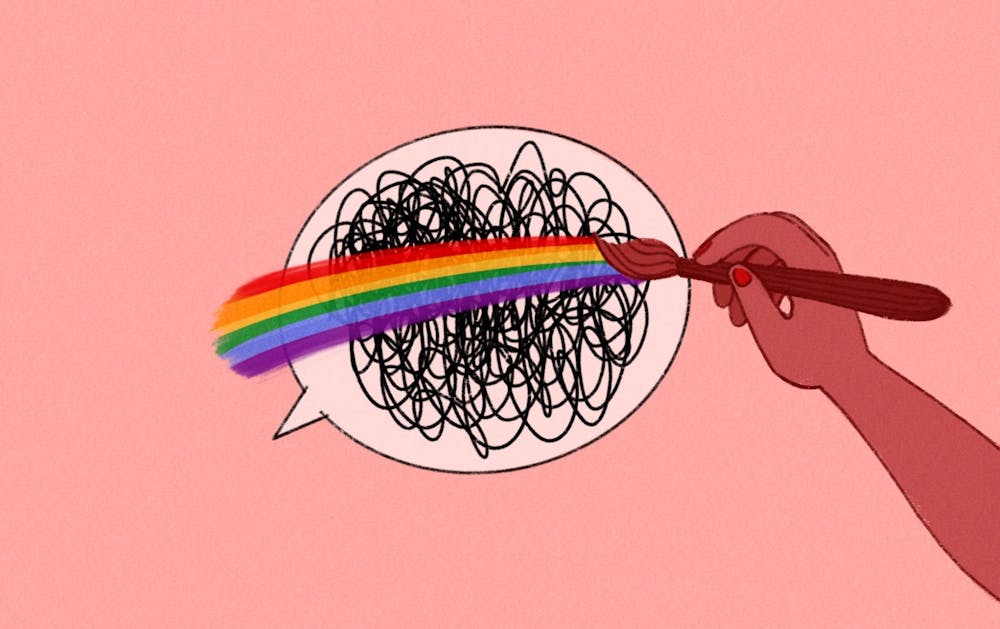Reclamation is an immensely powerful tool as communities and individuals have been reclaiming hate speech to take the power of these words back. Recently, a large part of the LGBTQ+ community has reclaimed the word "queer," freeing it from centuries of negative association.
"Queer" is still defined as strange or odd, even perverse. It is believed to have been derived from the German word "quer," which means crosswise or slanting, literally not straight. In the 1800s, it was used to describe men who were effeminate, or not straight, even though heterosexuality was not yet clearly defined as a sexual identity — because it was considered the norm.
The first account of the word "queer" being used as a slur is by Lord Douglas, Ninth Marquess of Queensbury, where he denounced his son's supposed lover, Lord Rosebery, with the phrase "snob queers like Rosebery" in the late 1800s.
By the 1950s, the word had lost its primary meaning of strange and was chiefly used as a homophobic slur. It was only in the late eighties that a movement was started to re-appropriate the word.
Gage Keranen, a senior majoring in biological sciences and the president of the Rainbow Coalition at ASU, said the word “queer” has gained popularity among members of the LGBTQ+ community on campus. The major reason behind this? Room for ambiguity, he said.
"A lot of us are not easily definable by the acronym LGBT," Keranen said. “Some of us are in the '+' and we’re not really mentioned very often because of convenience."
He said most people only say "LGBT," which can be harmful and exclusive to members of the community.
"They don’t really include the identities in the '+,'" Keranen said. "And, so, saying 'queer' allows us to have all of those further identities and even the identities in the first couple letters – LGBT – while not having to explain ourselves all the time.”
Wallace Hudson, training program specialist at one•n•ten, explained why the word is so popular among young LGBTQ+ individuals.
“The youth that I interact with find a lot of freedom in the word ‘queer’,” Hudson said. “Unlike words like 'gay' or 'non-binary' or 'transgender,' which only encompass one facet of someone’s life — gay including someone’s sexuality, transgender including someone’s gender — the term ‘queer’ encompasses both someone’s sexuality and gender.”
But there have been some discrepancies among members of the community regarding the word "queer."
Hudson said an acquaintance had been bullied for being gay with the word "queer" used a lot against them.
“And so, he really had no understanding of that term outside of being used as a slur,” Hudson said.
Those who have had recent experiences of being called "queer" as a slur are not comfortable with it being a part of polite vocabulary.
Assuming that a member of the wider LGBTQ+ community will be comfortable being described as queer is problematic, because different individuals have had different experiences and, therefore, relate to words and phrases very differently, Keranen said.
"If the word has been used toward them more recently, they have strong feelings about not reclaiming it and not hearing it," Keranen said.
It is necessary to wait for someone to self-identify as "queer" before using that word about them, Hudson said.
“I know that there are some young LGBT folks who have had experiences with that word being used negatively against them," they said. "And because of that, they will not identify with that word, and they do not like that word being used for them.”
While reclaiming is empowering, it is difficult to reclaim certain words because of the force with which they have been used toward members of the affected group, Keranen said.
“And, so, that’s where you see a lot of discrepancies between individuals as to whether or not certain words should be reclaimed, and whether or not it’s appropriate to use those words around other LGBTQ+ people because of, you know, the risk of anything being a trigger,” he said. “Certain people have experienced trauma where those words were involved.”
The point of reclamation is to give the power back to the people, as hackneyed as that sounds. The fact that there is a multifaceted conversation evolving around these words and whether or not they should be reclaimed – a conversation whose participants are the people themselves – is alone an indicator of success and a symbol of hope for the future.
Reach the reporter at abhilasha.mandal@asu.edu and follow @AbhilashaMandal on Twitter.
Like State Press on Facebook and follow @statepress on Twitter.




